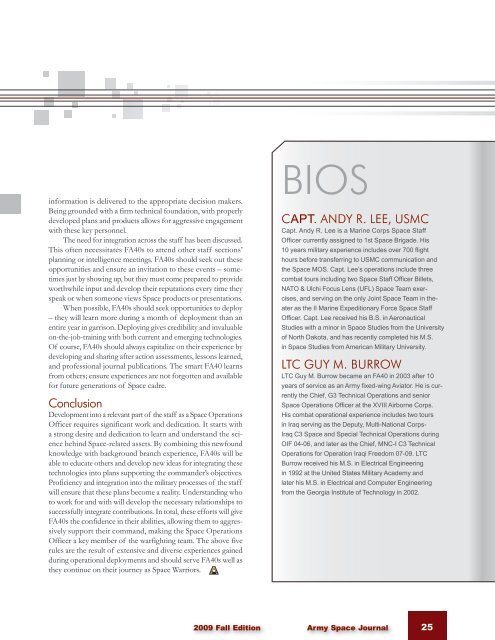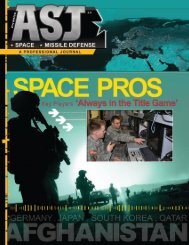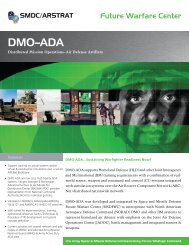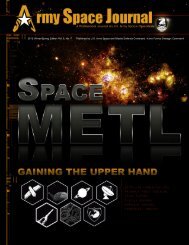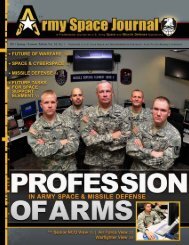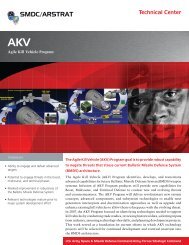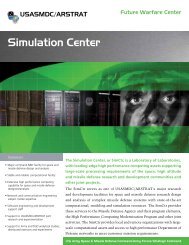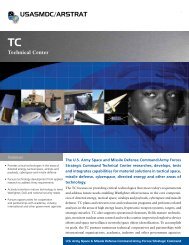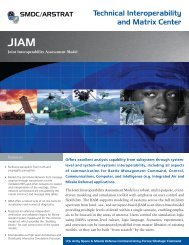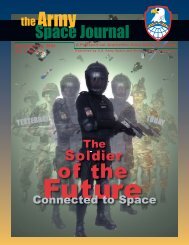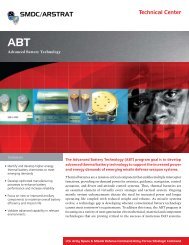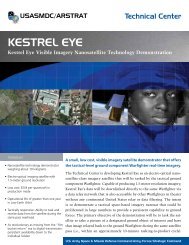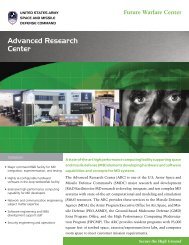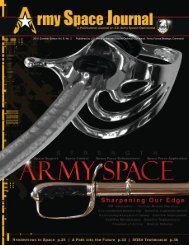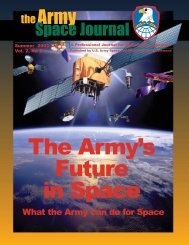Volume 8, Number 3 - Space and Missile Defense Command - U.S. ...
Volume 8, Number 3 - Space and Missile Defense Command - U.S. ...
Volume 8, Number 3 - Space and Missile Defense Command - U.S. ...
You also want an ePaper? Increase the reach of your titles
YUMPU automatically turns print PDFs into web optimized ePapers that Google loves.
information is delivered to the appropriate decision makers.<br />
Being grounded with a firm technical foundation, with properly<br />
developed plans <strong>and</strong> products allows for aggressive engagement<br />
with these key personnel.<br />
The need for integration across the staff has been discussed.<br />
This often necessitates FA40s to attend other staff sections’<br />
planning or intelligence meetings. FA40s should seek out these<br />
opportunities <strong>and</strong> ensure an invitation to these events – sometimes<br />
just by showing up, but they must come prepared to provide<br />
worthwhile input <strong>and</strong> develop their reputations every time they<br />
speak or when someone views <strong>Space</strong> products or presentations.<br />
When possible, FA40s should seek opportunities to deploy<br />
– they will learn more during a month of deployment than an<br />
entire year in garrison. Deploying gives credibility <strong>and</strong> invaluable<br />
on-the-job-training with both current <strong>and</strong> emerging technologies.<br />
Of course, FA40s should always capitalize on their experience by<br />
developing <strong>and</strong> sharing after action assessments, lessons learned,<br />
<strong>and</strong> professional journal publications. The smart FA40 learns<br />
from others; ensure experiences are not forgotten <strong>and</strong> available<br />
for future generations of <strong>Space</strong> cadre.<br />
Conclusion<br />
Development into a relevant part of the staff as a <strong>Space</strong> Operations<br />
Officer requires significant work <strong>and</strong> dedication. It starts with<br />
a strong desire <strong>and</strong> dedication to learn <strong>and</strong> underst<strong>and</strong> the science<br />
behind <strong>Space</strong>-related assets. By combining this newfound<br />
knowledge with background branch experience, FA40s will be<br />
able to educate others <strong>and</strong> develop new ideas for integrating these<br />
technologies into plans supporting the comm<strong>and</strong>er’s objectives.<br />
Proficiency <strong>and</strong> integration into the military processes of the staff<br />
will ensure that these plans become a reality. Underst<strong>and</strong>ing who<br />
to work for <strong>and</strong> with will develop the necessary relationships to<br />
successfully integrate contributions. In total, these efforts will give<br />
FA40s the confidence in their abilities, allowing them to aggressively<br />
support their comm<strong>and</strong>, making the <strong>Space</strong> Operations<br />
Officer a key member of the warfighting team. The above five<br />
rules are the result of extensive <strong>and</strong> diverse experiences gained<br />
during operational deployments <strong>and</strong> should serve FA40s well as<br />
they continue on their journey as <strong>Space</strong> Warriors.<br />
BIOS<br />
Capt. Andy R. Lee, USMC<br />
Capt. Andy R. Lee is a Marine Corps <strong>Space</strong> Staff<br />
Officer currently assigned to 1st <strong>Space</strong> Brigade. His<br />
10 years military experience includes over 700 flight<br />
hours before transferring to USMC communication <strong>and</strong><br />
the <strong>Space</strong> MOS. Capt. Lee’s operations include three<br />
combat tours including two <strong>Space</strong> Staff Officer Billets,<br />
NATO & Ulchi Focus Lens (UFL) <strong>Space</strong> Team exercises,<br />
<strong>and</strong> serving on the only Joint <strong>Space</strong> Team in theater<br />
as the II Marine Expeditionary Force <strong>Space</strong> Staff<br />
Officer. Capt. Lee received his B.S. in Aeronautical<br />
Studies with a minor in <strong>Space</strong> Studies from the University<br />
of North Dakota, <strong>and</strong> has recently completed his M.S.<br />
in <strong>Space</strong> Studies from American Military University.<br />
LTC Guy M. Burrow<br />
LTC Guy M. Burrow became an FA40 in 2003 after 10<br />
years of service as an Army fixed-wing Aviator. He is currently<br />
the Chief, G3 Technical Operations <strong>and</strong> senior<br />
<strong>Space</strong> Operations Officer at the XVIII Airborne Corps.<br />
His combat operational experience includes two tours<br />
in Iraq serving as the Deputy, Multi-National Corps-<br />
Iraq C3 <strong>Space</strong> <strong>and</strong> Special Technical Operations during<br />
OIF 04-06, <strong>and</strong> later as the Chief, MNC-I C3 Technical<br />
Operations for Operation Iraqi Freedom 07-09. LTC<br />
Burrow received his M.S. in Electrical Engineering<br />
in 1992 at the United States Military Academy <strong>and</strong><br />
later his M.S. in Electrical <strong>and</strong> Computer Engineering<br />
from the Georgia Institute of Technology in 2002.<br />
2009 Fall Edition Army <strong>Space</strong> Journal 25


